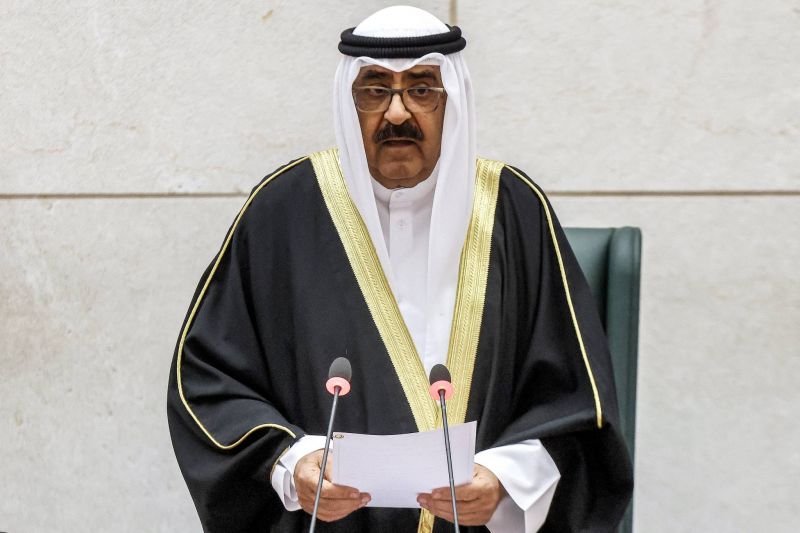
Kuwait's Crown Prince and deputy Emir Sheikh Meshal al-Ahmad al-Jaber al-Sabah delivers a speech during the opening ceremony of the 17th parliamentary term at the National Assembly (parliament) in Kuwait City on Oct. 31, 2023. (Credit: Yasser al-Zayyat/AFP)
A sluggish economy, political wrangling and delayed reforms have turned Kuwait into one of the Gulf's most laggard states, a reality Sheikh Meshal will have to confront as the new emir.
Coming to power at the age of 83, Sheikh Meshal, a veteran of Kuwait's security and intelligence apparatus, is already familiar with the tasks that lie ahead, having assumed most of his predecessor's key duties over the past two years.
But officially taking over from his half-brother Sheikh Nawaf who died on Saturday, he "inherits a challenging legacy," marked by delays to urgently needed reforms, said Issam Altawari, a Kuwaiti analyst.
Economist and Gulf specialist Justin Alexander said: "The decisions made during the next few years are of critical importance to determine whether Kuwait will flourish long-term.
"This includes establishing fiscal and economic policies that set the country on the right track and...navigating past the political squabbles that have caused Kuwait to undershoot its potential in recent decades."
Kuwait, which borders Saudi Arabia and Iraq, is home to seven percent of the world's crude reserves. It has little debt and one of the strongest sovereign wealth funds in the world.
However, it suffers from constant stand-offs between elected lawmakers and cabinets installed by the ruling Al-Sabah family, which maintains a strong grip over political life, despite a parliamentary system in place since 1962.
The deadlocks have prevented lawmakers from passing reforms to diversify the economy, while repeated budget deficits and low foreign investment have added to the air of gloom.
'First test'
According to Alexander, Sheikh Meshal's "first test will be selecting a crown prince" amid speculation over whether he will usher in a new generation of rulers.
He will have a year to make his pick, but much attention will be on whether he will be able to match the seven-day record set by his predecessor.
The new emir will also have to select a prime minister to form a cabinet – a move that will set the tone for relations with the opposition-led parliament, hailed as the most active in the Gulf.
A smooth reign will hinge on "cooperation between government and parliament," said Badr Al-Saif of Kuwait University.
"Constitutional reform down the line will be needed to... smoothen relations," Saif said.
Altawari said that overhauling the public sector was another clear priority as Kuwait suffers from bloated state spending and an oversized bureaucracy.
A draft 2023-2024 budget published this year allocated more than $86 billion to government spending, with 80 percent going on civil service wages and public subsidies.
But on Dec. 5, Sheikh Meshal ordered a pause in state hiring for a three-month period that is open to extension, signaling a move to tackle the problem.
The restructuring of state institutions will be a top priority for Sheikh Meshal, said Haila Al-Mukaimi, a political science professor at Kuwait University.
"He will merge some bodies together in addition to forming new ones," she told AFP, adding that he is also expected to bring in fresh faces.
'Post-oil era'
Sheikh Meshal spent many years in the interior ministry and was deputy chief of the Kuwait National Guard from 2004 to 2020.
During his long career in Kuwait's security and intelligence apparatus, he kept his distance from the often bitter disputes within the royal family.
He rises to the helm at a critical time for oil-producing Gulf states amid international moves towards an energy transition.
One of the hottest places on earth, OPEC member Kuwait is a major petro-state that still relies on fossil fuels for the vast majority of its income.
While fellow Gulf states Saudi Arabia and the United Arab Emirates have taken strides toward diversifying their economies away from oil, Kuwait still lags far behind.
"The country’s main project should be safely managing its transition to a post-oil era," Saif said.
The shift has been given greater urgency after nearly 200 states approved a first-ever call for the world to transition away from fossil fuels during the COP28 climate talks in Dubai which ended last week.
On the foreign policy front, not much is expected to change for Kuwait, a US ally that maintains good relations with Iran and its Gulf Arab neighbors, especially Saudi Arabia, said Saif.
"The incoming emir has high respect for Saudi and for its transformation," he said.
Coming to power at the age of 83, Sheikh Meshal, a veteran of Kuwait's security and intelligence apparatus, is already familiar with the tasks that lie ahead, having...